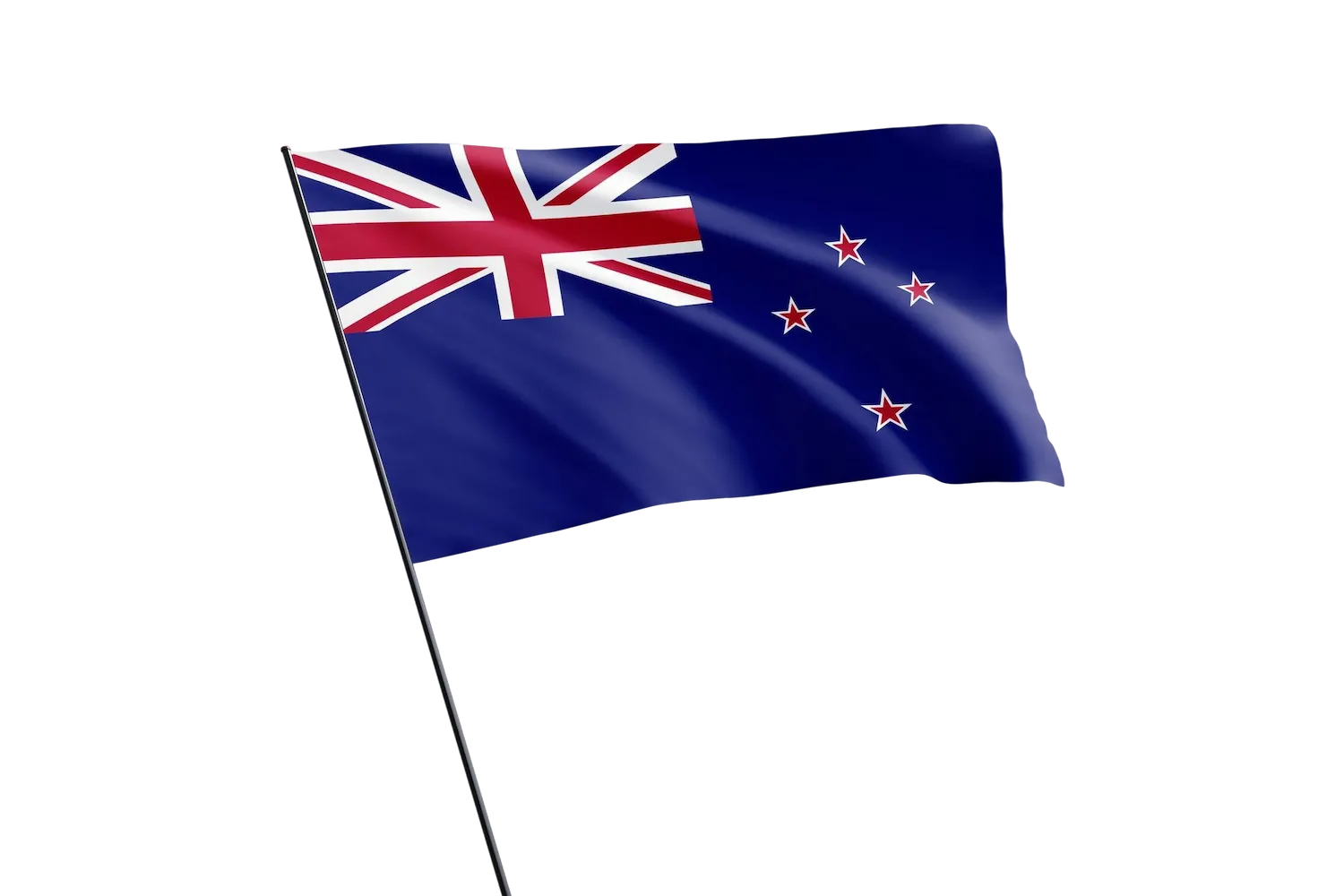Studying for a master's in New Zealand means you could be in a lecture in the morning and exploring stunning landscapes by the afternoon. It’s a reality for thousands of international students every year. All eight universities in New Zealand rank among the world’s best in 2025, offering top-quality education alongside incredible experiences. From the busy streets of Auckland to the cosy, student-friendly vibe of Dunedin, New Zealand is a perfect mix of great academics and unforgettable adventures.
Why Study in New Zealand?
Getting into the top universities of New Zealand means a top-quality education while enjoying a safe, friendly, and beautiful place to live. Here’s why so many international students, especially from India, choose it as their study destination:
1. Degrees Respected Worldwide
All eight universities in New Zealand are ranked among the Top 500 in the QS World University Rankings 2025, so your master’s degree in New Zealand will be valued no matter where you go.
2. Practical, Career-Focused Learning
Master’s courses in New Zealand with help from industry experts, so you learn skills that employers actually want. Many programs include internships and research projects to give you hands-on experience.
3. Safe & Welcoming Country
New Zealand is known for its warm, friendly people and political stability. It’s also one of the safest countries for students, making it easier to settle in and feel at home.
4. Work While You Study
You can work up to 20 hours a week during classes and full-time during holidays. This helps you earn money, gain work experience, and manage living costs.
5. Post-Study Job Options
Postgraduates in in-demand areas like IT, healthcare, and engineering are eligible for up to 3 years post-study work visas, with pathways to permanent residency.
6. Good Value for Money
Tuition fees and living costs are often lower than in countries like the UK, US, or Australia, but the quality of education is still world-class, making a New Zealand master’s degree a great choice.
7. Beautiful Places & Great Lifestyle
Whether you love buzzing cities or peaceful nature, New Zealand has it all. Mountains, beaches, forests, and a culture full of adventure and outdoor fun.
QS World University Rankings 2025
New Zealand takes education seriously, and it shows in the QS World University Rankings 2025. All eight universities are ranked among the Top 500 in the world. These rankings look at things like academic reputation, employer reputation, student-teacher ratio, research work, and how diverse and international the campuses are.
Here are the top New Zealand universities for master’s and what they’re best known for:
|
University |
QS Rank 2025 (approx.) |
Location |
Master’s Program Strengths |
|
University of Auckland |
65 |
Auckland |
Business, Engineering, Health Sciences, Law |
|
University of Otago |
197-214 |
Dunedin |
Health Sciences, Humanities, Science |
|
Massey University |
230-239 |
Palmerston North, Auckland, Wellington |
Agriculture, Aviation, Creative Arts |
|
Victoria University of Wellington |
240-244 |
Wellington |
Law, Politics, Environmental Studies |
|
University of Canterbury |
261 |
Christchurch |
Engineering, Environmental Science, Education |
|
University of Waikato |
250-281 |
Hamilton |
Business, Education, Computing |
|
Lincoln University |
371-407 |
Lincoln (Canterbury region) |
Agriculture, Environmental Management |
|
Auckland University of Technology (AUT) |
410-412 |
Auckland |
Creative Industries, Applied Technology |
Key Insight: The University of Auckland is still the best uni in New Zealand. Lincoln University and AUT also shine in their special areas, offering unique master’s programs in New Zealand that are closely connected to industry needs.
1. University of Auckland
QS 2025 Rank: 65
Location: Auckland
Overview: Founded in 1883, the University of Auckland is the largest and top-ranked university in New Zealand. It offers 150+ programs in areas like business, engineering, health sciences, law, and creative arts.
- Strengths: World-class research, strong employer reputation, and a large international student community.
- Tuition Fees: NZD 40,000-50,000/year (≈ INR 22-27 L)
- Indian Student Ratio: approx. 7-10%
- Acceptance Rate: approx. 40%
2. University of Otago
QS 2025 Rank: 197-214
Location: Dunedin (with campuses in Wellington, Christchurch, Invercargill, and Auckland)
Overview: Established in 1869, Otago is New Zealand’s oldest university. It’s famous for research-based learning, especially in health sciences, humanities, and sciences.
- Strengths: Top medical school, vibrant student life, and wide research opportunities.
- Tuition Fees: NZD 22,000-35,000/year (≈ INR 12-19 L)
- Indian Student Ratio: approx. 2-9%
- Acceptance Rate: approx. 58%
3. Massey University
QS 2025 Rank: 230-239
Location: Palmerston North, Auckland, Wellington (plus online study options)
Overview: Massey is known for its flexible learning, offering both on-campus and online programs. It’s popular for agriculture, aviation, business, and creative arts.
- Strengths: Practical learning, innovative research, and strong links to industry.
- Tuition Fees: NZD 22,000-32,000/year
- Indian Student Ratio: approx. 3-7%
4. Victoria University of Wellington
QS 2025 Rank: 240-244
Location: Wellington
Overview: Located in New Zealand’s capital, Victoria University is well-regarded for law, politics, creative arts, and environmental studies.
- Strengths: Close to government and cultural hubs, strong research focus.
- Tuition Fees: NZD 26,000-35,000/year
- Indian Student Ratio: approx. 5-7%
5. University of Canterbury
QS 2025 Rank: 261
Location: Christchurch
Overview: Founded in 1873, Canterbury is known for engineering, environmental science, and education programs with a focus on sustainability.
- Strengths: Modern campus, hands-on learning, and global research collaborations.
- Tuition Fees: NZD 27,000-36,000/year
- Indian Student Ratio: approx. 6-8%
6. University of Waikato
QS 2025 Rank: 250-281
Location: Hamilton (with campuses in Tauranga and China)
Overview: Famous for business, education, and computing, Waikato offers career-focused courses and strong global partnerships.
- Strengths: Wide program options, leadership in Māori and Pacific studies, industry connections.
- Tuition Fees: NZD 25,000-33,000/year
- Indian Student Ratio: approx. 5-7%
7. Lincoln University
QS 2025 Rank: 371-407
Location: Lincoln (Canterbury region)
Overview: The smallest university in NZ, Lincoln specialises in agriculture, environmental management, and wine science.
- Strengths: Strong industry ties, expert faculty, and niche programs.
- Tuition Fees: NZD 26,000-33,000/year
- Indian Student Ratio: approx. 4-6%
8. Auckland University of Technology (AUT)
QS 2025 Rank: 410-412
Location: Auckland
Overview: AUT is the youngest university in NZ, established in 2000. It focuses on applied learning, modern teaching, and real-world projects.
- Strengths: Industry-connected courses, advanced technology use, and lively campus life.
- Tuition Fees: NZD 25,000-35,000/year
- Indian Student Ratio: approx. 7-9%
Cost of a Master's in New Zealand
Studying in New Zealand can be more affordable than other popular countries like the UK, the US, or Australia, but you still need to plan your budget well. Your main costs will include tuition fees, living expenses, and extras like health insurance and study materials.
1. Tuition Fees
Tuition fees depend on your university and course. Here’s a general idea for international students:
|
Level of Study |
Annual Tuition (NZD) |
Annual Tuition (INR) |
|
Postgraduate |
26,000 - 47,000 |
₹14 - ₹26 Lakh |
Exchange rate used: 1 NZD ≈ ₹55-57 (may change).
2. Living Expenses
Your living costs will depend on where you live, your lifestyle, and your accommodation type. The North Island (Auckland, Wellington) is usually a bit more expensive than the South Island.
|
Location |
Annual Cost (NZD) |
Annual Cost (INR) |
|
North Island |
18,000 - 25,000 |
₹10 - ₹14 Lakh |
|
South Island |
15,000 - 20,000 |
₹8.5 - ₹11.5 Lakh |
3. Accommodation Costs
- University Halls of Residence: NZD 200 - 400 per week
- Private Rentals: NZD 180 - 500 per week
- Shared Apartments: NZD 100 - 250 per week
4. Additional Expenses
- Health Insurance (required): NZD 600 - 800/year
- Utilities & Internet: NZD 100 - 150/month
- Course Materials & Stationery: NZD 500 - 1,000/year
- Public Transport: NZD 20 - 50/week
Tip: Most international students work part-time (up to 20 hours a week) to earn extra money, gain experience, and manage living costs.
Popular Courses for International Students
New Zealand has a wide range of courses, but some are especially popular with international students because they lead to great job opportunities, have strong industry links, and are in high demand around the world. These are also the top choices for masters in New Zealand for international students.
1. Engineering & Technology
- Specialisations like Civil, Mechanical, Electrical, and Software Engineering are always in demand.
- Many courses focus on sustainability, renewable energy, and innovative design.
2. Business & Management
- MBA programs and master’s in management in New Zealand are very popular.
- Strong industry partnerships mean you can get hands-on experience through internships.
3. Computer Science & Information Technology
- Trending fields like Data Science, Cybersecurity, AI, and Cloud Computing are a big reason students pick a masters in New Zealand computer science.
- High job opportunities in New Zealand’s growing tech industry.
4. Health Sciences & Medicine
- Otago and Auckland are top choices for medicine, dentistry, nursing and even a psychology masters in New Zealand.
- Many programs include research and clinical training.
5. Agriculture & Environmental Sciences
- Courses in agriculture, horticulture, viticulture (wine production), and sustainable farming are respected worldwide.
- Lincoln University and Massey University are leaders in this field.
6. Creative Arts & Design
- Covers Film, Animation, Game Design, and Fine Arts.
- AUT and Victoria University have strong links with the creative industry, helping students connect with employers.
Scholarships & Financial Aid
New Zealand offers many scholarships to help international students make studying more affordable. These can come from the government, universities, or private organisations, and may cover part or all of your tuition fees, living costs, or both.
1. Government-Funded Scholarships
New Zealand Excellence Awards (NZEA)
- Funded by Education New Zealand (ENZ) and NZ universities.
- Made especially for Indian students.
- Covers part of your tuition fees for postgraduate study.
Commonwealth Scholarships
- For students from Commonwealth countries, including India.
- Usually covers tuition, living costs, travel, and insurance.
2. University-Specific Scholarships
University of Auckland International Student Excellence Scholarship
- Up to NZD 10,000 towards tuition.
- Open for postgrad students.
University of Otago International Pathway Scholarship
- NZD 4,000 towards a foundation or pathway program.
Victoria Tongarewa Scholarship (Victoria University of Wellington)
- NZD 5,000-10,000 towards tuition for postgraduate study.
Lincoln University International Scholarships
- NZD 3,000-10,000, awarded based on good academic results.
3. Subject-Specific & Private Scholarships
- Available for fields like engineering, business, agriculture, and creative arts.
- Often funded by professional groups or industry partners.
4. How to Apply
- Start early: Deadlines can be 6-12 months before your course starts.
- Check requirements: You may need good grades, English test scores, and sometimes leadership or community work experience.
- Prepare documents: Transcripts, Statement of Purpose, recommendation letters, and proof of extracurricular activities.
Admission Requirements
If you want to pursue a master's degree in New Zealand, you’ll need to meet certain academic and English language requirements. These can change depending on the university and course, but here’s a simple overview:
1. Academic Requirements
- You need a recognised bachelor’s degree in a related subject, usually with a GPA of 2.7-3.0/4.0 (or similar).
- Some courses, like an MBA, may also need 2-3 years of work experience.
2. English Language Proficiency
Most universities accept IELTS, TOEFL, or PTE Academic scores. Here are the common minimums:
- IELTS (Academic): 6.0-6.5 overall, no band below 6.0
- TOEFL iBT: 80-90 overall
- PTE Academic: 58-65 overall
Note: Some competitive programs like health sciences may ask for higher scores (e.g., IELTS 7.0+).
3. Application Documents
- Academic transcripts and certificates
- English test scores
- Statement of Purpose (SOP)
- Letters of Recommendation (LORs)
- Passport copy
- Updated CV (for postgrad or work-experience-based courses)
4. Additional Requirements (If Needed)
- Portfolio: For creative arts, design, or architecture courses
- Research Proposal: For PhD or research-based master’s programs
- Interview: Some programs may require an online or in-person interview
Some 1-year masters in New Zealand may have unique entry requirements like interviews or proposals.
Student Visa & Work Rights
If you want to study for a masters in New Zealand universities, you’ll need a New Zealand Student Visa. This visa lets you study and also gives you certain work rights during and after your course.
1. Student Visa Requirements
To apply for a student visa, you usually need:
- Offer of a Place from a recognised New Zealand university or college
- Proof of Funds: At least NZD 20,000 per year (or NZD 1,667 per month) for living costs
- Proof of Tuition Fee Payment, or proof that you have the money to pay
- Valid Passport (must be valid for at least 3 months after you leave New Zealand)
- Medical & Travel Insurance (compulsory for all students)
- Health & Character Certificates (medical exam, police clearance if needed)
2. Work Rights During Study
- Part-Time: Up to 20 hours a week during classes
- Full-Time: During scheduled breaks and summer holidays
- Students doing certain research master’s and PhD programs can work full-time all year round
3. Post-Study Work Visa
After finishing your course, you may get a Post-Study Work Visa for up to 3 years (length depends on your qualification and where you studied).
- Jobs in high-demand fields like IT, engineering, and healthcare can improve your chances of finding long-term work.
- This visa can also help you move towards Permanent Residency if you meet the requirements.
4. Processing Time & Fees
- Processing Time: Around 4-6 weeks (can vary depending on applications)
- Visa Fee: About NZD 430 (depends on where and how you apply)
Career Prospects & Post-Study Pathways
Studying in New Zealand doesn’t just give you a world-class education; it also opens doors to great job opportunities and long-term career options. Completing a New Zealand master’s program is highly valued by employers across IT, healthcare, engineering, and business.
1. Job Opportunities After Postgraduation
High-Demand Fields:
- Information Technology: Software Development, Data Science, Cybersecurity
- Engineering: Civil, Mechanical, Electrical
- Healthcare: Nursing, Medicine, Allied Health
- Education & Teaching
- Agriculture, Horticulture & Environmental Science
- Business & Financial Services
Most universities have career services, industry partnerships, and internship programs to help you get work experience and find jobs quickly after graduation.
2. Post-Study Work Visa Benefits
- Work in New Zealand for up to 3 years after your course (time depends on your qualification and where you studied).
- Get valuable work experience that employers really value.
- Can lead towards Permanent Residency under the Skilled Migrant Category.
3. Average Postgraduate Salaries (may vary by field and location)
|
Field |
Average Annual Salary (NZD) |
Average Annual Salary (INR) |
|
IT & Software Development |
65,000 - 80,000 |
₹35 - ₹44 Lakh |
|
Engineering |
60,000 - 75,000 |
₹32 - ₹41 Lakh |
|
Healthcare & Nursing |
58,000 - 72,000 |
₹31 - ₹39 Lakh |
|
Business & Finance |
55,000 - 70,000 |
₹30 - ₹38 Lakh |
|
Education |
50,000 - 65,000 |
₹27 - ₹35 Lakh |
Exchange rate: 1 NZD ≈ ₹55
4. Pathways to Permanent Residency (PR)
- Work in a job listed on New Zealand’s Long-Term Skill Shortage List to increase your PR chances.
- New Zealand qualifications give you extra points in the Skilled Migrant Category.
- Staying employed and meeting income requirements can speed up your residency process.
5. Global Career Advantage
A degree from a New Zealand university is recognised worldwide, so you can build your career not just in New Zealand but also in Australia, the UK, the US, Canada, and many other countries.
Tips for Choosing the Right University
All eight universities in New Zealand are in the QS Top 500 for 2025, so you can’t go wrong with quality. Many are also among the top 5 universities in New Zealand for specific fields. Here’s how to make the right choice:
1. Match Your Course to University Strengths
Choose a university that’s strong in your field:
- Engineering & Technology: University of Auckland, University of Canterbury
- Health Sciences: University of Otago, University of Auckland
- Agriculture & Environmental Sciences: Lincoln University, Massey University
- Creative Arts: AUT, Victoria University of Wellington
2. Think About Location & Lifestyle
- City universities (Auckland, Wellington, Christchurch) offer more part-time jobs, networking, and an active social life.
- Regional universities (Dunedin, Lincoln, Palmerston North) are often more affordable and have a close-knit community feel.
3. Check the Costs
- Compare tuition fees and living costs in different cities.
- The North Island is usually more expensive than the South Island.
4. Explore Scholarships & Financial Aid
- See if the university offers scholarships for international students.
- Some give entry scholarships for first-year students based on good grades.
5. Look at Postgraduate Outcomes
- Check how many postgraduates find jobs quickly and whether the university has strong links with employers.
- Universities with good internship programs can give you a head start.
6. Check Campus Facilities & Student Support
- Look for modern libraries, labs, sports facilities, and student services.
- A good career centre can help you find part-time work while studying and jobs after graduation.
Conclusion
With degrees recognised worldwide, top-ranked universities, and a learning style that encourages creativity, New Zealand gives you an education that can take you anywhere. Whether you study in a lively city or a calm regional town, your time here will prepare you for a successful career anywhere in the world.







